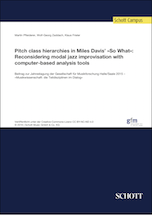In this paper, we investigated pitch class hierarchies in modal jazz improvisation within a case study of the solos and bass lines of »So What«. We were able to show that the tones played by Davis, Coltrane, and Adderley, as well as by Chambers, could be described as pitch class hierarchies. In general, the tones played most frequently in the A sections are the tonic and fifth of D Dorian, followed by the second, fourth, third, and seventh scale degree. This usage clearly emphasizes the modal character of the piece, particularly in the A sections. The major sixth degree is used less often, but played more regularly than the remaining pitch classes outside the D Dorian scale, which constitute about 10% of all tones in the solos as well as in Chambers’ bass lines. In contrast to bebop and hardbop improvisation, the players use chromaticism only for colour and for smoothing out lines with passing tones. …
Format · Aufsatz
URN · urn:nbn:de:101:1-20160919403
Publikationsort · Schott Campus, Mainz 2016
Zitation · Pfleiderer, Martin; Zaddach, Wolf-Georg; Frieler, Klaus: »Pitch class hierarchies in Miles Davis’ ›So What‹: Reconsidering modal jazz improvisation with computer-based analysis tools«, in: Beitragsarchiv zur Jahrestagung der Gesellschaft für Musikforschung Halle/Saale 2015 – »Musikwissenschaft: die Teildisziplinen im Dialog«, hrsg. von Wolfgang Auhagen und Wolfgang Hirschmann [https://schott-campus.com/gfm-jahrestagung-2015], Mainz 2016 [Schott Campus, urn:nbn:de:101:1-20160919403].
Das Beitragsarchiv fasst Referate und Posterpräsentationen der Jahrestagung der Gesellschaft für Musikforschung 2015 in Halle/Saale zusammen, bietet einen guten Überblick über derzeit in der Musikwissenschaft verhandelte Themen und zeigt Wege für eine intra-interdisziplinäre Zusammenarbeit auf. Es spiegelt hiermit das der Tagung zugrundeliegende Konzept »Musikwissenschaft: die Teildisziplinen im Dialog« wider.
→ Beitragsarchiv zur Jahrestagung der Gesellschaft für Musikforschung Halle/Saale 2015
